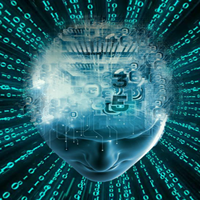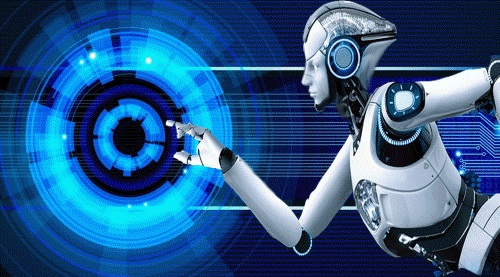AI tutorialslearning manual
Published on 2023-04-20 00:10:05 · 中文 · بالعربية · Español · हिंदीName · 日本語 · Русский язык · 中文繁體

The artificial intelligence tutorial provides an introduction to AI, which will help you understand artificial intelligence. In this tutorial, we also discuss various popular topics such as the history of AI, applications of AI, deep learning, machine learning, natural language processing, reinforcement learning, Q-learning, intelligent agents, various search algorithms, and more.
Our AI tutorials are prepared from the basic level, so you can easily understand the complete tutorial from basic concepts to advanced concepts.
What is artificial intelligence?
In today's world, technology is evolving very rapidly, and we are getting in touch with other new technologies every day.
Here, one of the technologies that is booming in computer science is artificial intelligence, which is ready to make a new revolution in the world by manufacturing intelligent machines. It currently works in various subfields, from general to specific, such as self-driving cars, playing chess, proving theorems, playing music, painting, etc.
AI is one of the fascinating fields of computer science and will have a lot of room for development in the future. AI tends to make machines work like humans.

Artificial intelligence consists of two words, artificial and intelligence, where artificial defines "artificial ability" and intelligence defines "thinking ability", so AI means "human thinking ability".
Therefore, we can define AI as:
"It's a branch of computer science through which we can create intelligent machines that behave like people, think like people and are able to make decisions."
Artificial intelligence exists when a machine has human-based skills such as learning, reasoning, and problem solving.
With artificial intelligence, you don't need to pre-program the machine to do certain things, and although you can create an algorithm machine with a programmed algorithm that works with your own intelligence, that's the beauty of AI.
It is believed that AI is not a new technology, and some say that in Greek mythology, there were early robots that could work and behave like humans.
Why use artificial intelligence?
Before learning artificial intelligence, we should know the importance of artificial intelligence and why we should learn it. Here are some of the top reasons to learn about AI:
With AI, you can create software or devices that can solve real problems such as health problems, marketing, traffic problems, etc. very easily and accurately.
With AI, you can create your own personal virtual assistants such as Cortana, Google Assistant, Siri, and more.
With AI, you can build robots that can work in environments where human survival is threatened.
AI opens the way for other new technologies, new devices, and new opportunities.
The goal of artificial intelligence
Here are the main goals of AI:
Copy human intelligence
Solve knowledge-intensive tasks
Intelligent connection between perception and action
Build a machine that can perform tasks that require human intelligence, such as:
Proof theorem playing chess to plan some surgical procedures driving in traffic
Create a system that can exhibit intelligent behavior, learn new things on its own, demonstrate, interpret and advise the user.
What is artificial intelligence?
AI is not only a part of computer science, even if it is so big, many other factors are needed to facilitate it. To create AI first, we should know how intelligence is composed, so intelligence is an invisible part of the brain, a combination of reasoning, learning, problem-solving understanding, language understanding, etc.
To realize the above factors of a machine or software, artificial intelligence needs to follow the following principles:
mathematics
biology
psychology
sociology
computer science
Neuronal research
statistics

Advantages of artificial intelligence
Here are some of the key benefits of AI:
High accuracy with fewer errors: Since AI machines or systems make decisions based on prior experience or information, they tend to reduce errors and improve accuracy.
High speed: Since the AI system can beat the chess champion in a chess game, the AI system can make decisions very quickly and quickly.
High reliability: AI machines are very reliable, can perform the same action multiple times, and with high precision.
For at-risk areas: AI machines are useful in situations where dropping bombs, exploring the ocean floor, hiring people can be risky.
Digital Assistant: AI is very useful for providing digital assistants to users, for example, various e-commerce websites are currently using AI technology to display products according to customer requirements.
Can be used as a utility: AI is very useful for utilities, such as self-driving cars, which can make our journey safer and easier, facial recognition for security purposes, natural language processing in ways to communicate with humans in human language, etc.
Disadvantages of artificial intelligence
Every technology has some drawbacks, and so does artificial intelligence. Still such a favorable technology, it has some drawbacks to keep in mind when creating AI systems. Here are the disadvantages of AI:
High cost: The hardware and software requirements of AI are very expensive because it requires a lot of maintenance to meet the current world needs.
Can't use it out of the box: Even if we're using AI to make smarter machines, we still can't do it out of the box because robots can only do the work they're trained to do by people who are trained or programmed.
No emotions and emotions: AI machines can perform excellently, but still do not have this emotion, so they cannot develop any emotional attachment to humans, and are sometimes harmful to users if not properly cared for.
Increased dependence on machines: As technology evolves, people become more and more dependent on devices, so they lose intelligence.
No primitive creativity: Because humans are so creative that some new ideas can be imagined, AI machines still can't beat human intelligence, nor can they use creativity and imagination.